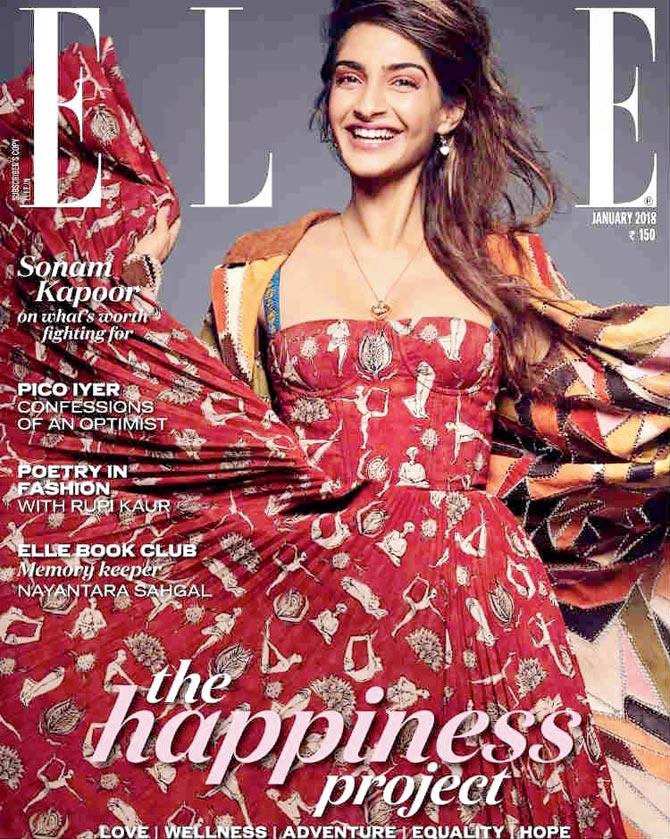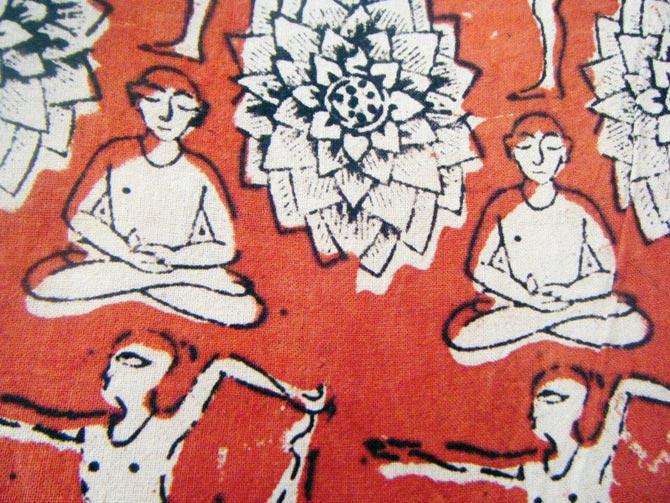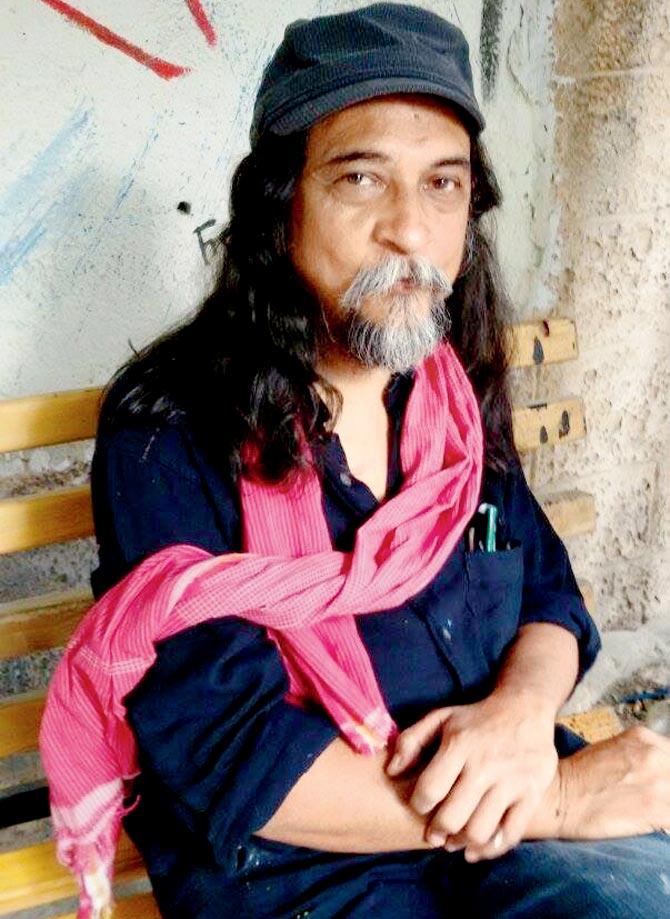People Tree accuses Dior of ripping off their original print for a dress worn by Sonam Kapoor for a top fashion magazine cover


Sonam wears the controversial corset dress. Pic/John-Paul Pietrus For Elle India
ADVERTISEMENT
A brick tone, printed corset dress that Sonam Kapoor sports on the cover of the January edition of a fashion magazine found itself at the centre of a controversy on Tuesday after Delhi-based design studio, People Tree, claimed the print was their original.
Kapoor, said a text caption, was outfitted in a dress from Christian Dior's Resort 2018 fashion show for the shoot helmed by London-based photographer John-Paul Pietrus. "I'm angry. It's virtually a copy-paste job of our design," People Tree's co-founder Orijit Sen, 55, told mid-day over the phone from Goa.

People Tree's The Yoga Print
The graphic designer created the print in question, The Yoga Print, in early 2000, right after he founded the collaborative art and design studio with wife Gurpreet Sidhu in 1990. Since, it has appeared widely on T-shirts, tunics, shirts, sun dresses and fabric yardage, all sold under the People Tree label. "It's one of our classics, which has sustained itself because of its popularity. It's not just a question of inspiration. They [Dior] have also copied the colour combination. It's a total rip off. We are in talks with a lawyer to see what our legal options are," said Sidhu.

People Tree's original block print of The Yoga Print
People Tree works in collaboration with Bindaas Collective for natural dyes, and its garments are hand block-printed in Kaladera village of Rajasthan. Sen argues, that an incident like this goes beyond design copyright infringement, impacting a community of craftspeople. "India is a hotbed of textiles. Gandhiji used khadi as a symbol of resistance and change. Now, mega brands are walking all over our heritage," said a furious Sen, who incidentally is also the artist behind cult design, The Disappearing Tiger, that was translated onto a hand block-printed T-shirt a decade ago, and made it to the coveted The Fabric of India exhibition at London's V&A Museum in 2015.

Suneera Madhok
Sen does not support the idea of copyrighting original designs to safeguard himself from plagiarism. "Art is the free-flowing exchange of ideas. Would I rather concern myself with protecting it? Instead of supporting and honouring Indian crafts and textiles, they [big labels] are feeding off our hard labour," he said. Sen said he has original sketches of the print from 2000 to prove he owns the pattern, but isn't sure it's enough for a "small designer to take Dior to court".

People Tree co-founder Orijit Sen
His fear may not be unfounded. Suneera Nerissa Madhok, founding partner of Nomos Associates, a firm that focuses on legal strategy surrounding intellectual property, technology and nascent stage businesses, says that while to an ordinary man of prudent judgment, it [Dior dress print] would seem to be a substantial or identical imitation, Section 15 of the Copyright Act states that copyright in a design shall cease when any article to which the design was applied, is reproduced more than 50 times by an industrial process by the owner of the copyright or under a registered license. More importantly, failure to register a creation capable of being registered as a design may result in loss of copyright and design protection.
Social media users trolled the luxury design house on Tuesday morning, with veteran Goa-based designer Wendell Rodricks reposting Sen's Facebook post which called the act 'Unchristian Dior'. "Are you bereft of ideas that you need to steal print designs?" Sen had written.Masaba Gupta, who earned her fame and success largely through trailblazing prints, said copyright laws in India have loopholes. "If I tweak the design, add a simple dot or a smudge — nothing significant — then it becomes a whole new design."
Textile revivalist and Benarasi saree crusader Sanjay Garg agrees. According to him, India continues to be known as a producer rather than a creator of original designs. "Only when we assert influence in terms of design and fashion will we be taken seriously. Aur yeh bheek main nahin milega [we can't beg for it]. We have to fight for it," he told mid-day, sharing that patterns, which feature on his brocade lehengas are copyright protected. "But they still get lifted with a slight shift in colour or motif placement. It's a problem that gives designers like myself sleepless nights." mid-day reached out to Sonam Kapoor and Christian Dior. Neither responded until the time of going to press.
Catch up on all the latest entertainment news and gossip here.
Download the new mid-day Android and iOS apps to get updates on all the latest and trending stories on the go
 Subscribe today by clicking the link and stay updated with the latest news!" Click here!
Subscribe today by clicking the link and stay updated with the latest news!" Click here!






